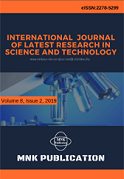DOI:10.29111/ijlrst ISRA Impact Factor:3.35
Research Paper Open Access
International Journal of Latest Research in Science and Technology Vol.3 Issue 6, pp 52-64,Year 2014
Correspondence should be addressed to :
Received : 21 October 2014; Accepted : 07 November 2014 ; Published : 31 December 2014

| Download | 125 |
|---|---|
| View | 181 |
| Article No. | 10421 |
Studying trust in online environment has especial importance for researchers, engineers, managers, economic investors. E-Commerce has recently been one of the new solutions in the efficiency function of business firms. Trust is a complex concept that has been studied by many disciplines, such as laws, business, political, sociology, psychology, among others. Therefore, in business, factors affecting the relationship between customers and vendors in trade either small or large scale, such as security, satisfaction, loyalty and trust must be examined in each form. In addition, the behaviors before purchase, during purchase, after the purchase are also different with each other in three forms of commercial transactions, and the topic of trust is brought up in a chain of trading processes. In other words, to assess the trust of the people or customers to any electronic trading system, we have to review and compare factors of trust and security in the chain of electronic business. Trust is a factor whose establishment is influenced by the type of the business, because the business type is actually the way of interaction between the two parties involved in exchange and its chain. The flow of information in any type of business has its diversity and difference. In this research, we investigate trust factors at electronic transactions in the context of e-commerce.
Copyright © 2014 Issa Najafi et al. This is an open access article distributed under the Creative Commons Attribution 4.0 International (CC BY 4.0) license which permits unrestricted use, distribution, and reproduction in any medium, provided the original work is properly cited.
Issa Najafi , " Investigation Trust Factors At Electronic Transactions In The Context Of E-commerce ", International Journal of Latest Research in Science and Technology . Vol. 3, Issue 6, pp 52-64 , 2014

MNK Publication was founded in 2012 to upholder revolutionary ideas that would advance the research and practice of business and management. Today, we comply with to advance fresh thinking in latest scientific fields where we think we can make a real difference and growth now also including medical and social care, education,management and engineering.

We offers several opportunities for partnership and tie-up with individual, corporate and organizational level. We are working on the open access platform. Editors, authors, readers, librarians and conference organizer can work together. We are giving open opportunities to all. Our team is always willing to work and collaborate to promote open access publication.

Our Journals provide one of the strongest International open access platform for research communities. Our conference proceeding services provide conference organizers a privileged platform for publishing extended conference papers as journal publications. It is deliberated to disseminate scientific research and to establish long term International collaborations and partnerships with academic communities and conference organizers.